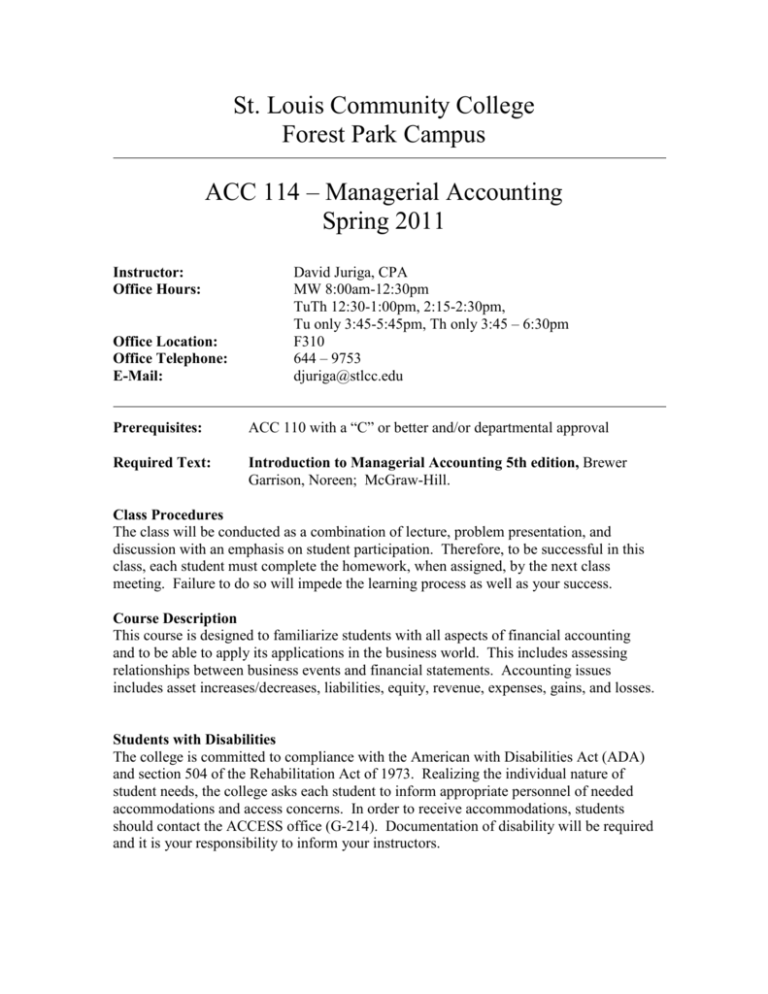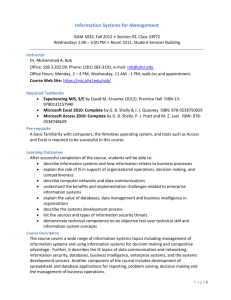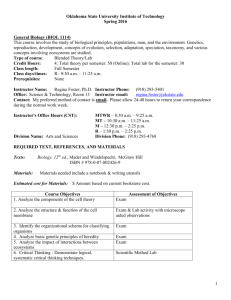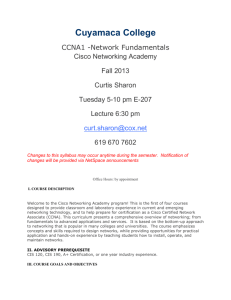Prerequisites: ACC 110 with a “C” or better and/or departmental
advertisement

St. Louis Community College Forest Park Campus ACC 114 – Managerial Accounting Spring 2011 Instructor: Office Hours: Office Location: Office Telephone: E-Mail: David Juriga, CPA MW 8:00am-12:30pm TuTh 12:30-1:00pm, 2:15-2:30pm, Tu only 3:45-5:45pm, Th only 3:45 – 6:30pm F310 644 – 9753 djuriga@stlcc.edu Prerequisites: ACC 110 with a “C” or better and/or departmental approval Required Text: Introduction to Managerial Accounting 5th edition, Brewer Garrison, Noreen; McGraw-Hill. Class Procedures The class will be conducted as a combination of lecture, problem presentation, and discussion with an emphasis on student participation. Therefore, to be successful in this class, each student must complete the homework, when assigned, by the next class meeting. Failure to do so will impede the learning process as well as your success. Course Description This course is designed to familiarize students with all aspects of financial accounting and to be able to apply its applications in the business world. This includes assessing relationships between business events and financial statements. Accounting issues includes asset increases/decreases, liabilities, equity, revenue, expenses, gains, and losses. Students with Disabilities The college is committed to compliance with the American with Disabilities Act (ADA) and section 504 of the Rehabilitation Act of 1973. Realizing the individual nature of student needs, the college asks each student to inform appropriate personnel of needed accommodations and access concerns. In order to receive accommodations, students should contact the ACCESS office (G-214). Documentation of disability will be required and it is your responsibility to inform your instructors. Evaluation Procedures The final grade will be determined by summing the total points actually earned on the examinations, quizzes, homework, and class participation. Your individual total points will then be divided by the total points possible and this percentage score will be used to assign a letter grade, as shown below. A ==> 90– 100% B ==> 80 – 89% C ==> 70 – 79% D ==> 60 – 69% F ==> Below 60% Course Grade 3 Exams @ 100 points = Chapter Assignments @ = Project Professionalism = 300 30 10 10 350 86% 8% 3% 3% Exams Four exams will be given consisting of objective questions as well as short-answer application problems relating to homework. Exams must be taken at the time designated by the instructor and therefore cannot be taken early. I have a 10-minute rule regarding my exams. If you are not present at the start of an exam, you will be able to show up 10 minutes late and still attempt the exam. After 10 minutes have expired, you will no longer be permitted to attempt that particular exam. The final exam is comprehensive. Note: You may drop your lowest exam score. Class Assignments Students are expected and will be evaluated based on class assignments. Assignments may include pop quizzes, textbook exercises, as well as handouts given by the instructor. Most assignments will require you to complete the work prior to coming to class. The due dates for each assignment will be given as they occur so please pay attention in class and also check the Blackboard site regularly for announcements. Note: Each student will receive one free assignment grade. For example, if there are 9 chapters covered, then each student only needs to turn in 8 assignments to receive the maximum points allowed. Please note that you cannot make up any missed “in-class” exercise. Also, failure to complete any assignment within the due date assigned will result in ZERO points for that particular activity. Project Students will be required to complete one project during the semester. The project will consist of a case study related to concepts covered in your textbook. Specific details regarding the scope and due date for this assignment will be given during the mid-part of the semester. 2 Class Professionalism Students will be expected to behave professionally throughout the semester. Professional behavior includes but is not limited to the following: Listening intently while the instructor is speaking. Listening to your peers while they ask questions. Working together during in-class participation exercises. Coming to class prepared and ready to learn accounting. Some examples of inappropriate behavior include the following: Browsing the Internet during any part of the class time Talking on cell phones or forgetting to turn your cell phone to silent during class. Sharing calculators on exams (this is strictly forbidden) Failing to come to class prepared and then asking questions that have already been asked in class. Refusing or unwilling to work together in class on class participation exercises. Consistently coming late to class. Good class attendance is a vital part of professionalism in my class. Therefore, your professionalism points will be affected by poor attendance. Note: Poor attendance includes showing up to class late as well as leaving class before the class time is over. These are just a few examples of behavior that I feel are rude and not acceptable in my classroom. I understand that most of you are adults and already know right from wrong, but based on my experience, it is necessary to remind some of those that are not aware of professional behavior. Please note that this part of your grade is based solely on my observations of your activities while in my classroom (so always be aware that I am watching). Finally, for your information about the class, YOU are responsible for all discussions, assignments, announcements, etcetera made in class whether or not YOU are in attendance. Make-ups All make-up exams will be comprehensive and given during the week of final exams. If a student has missed more than one exam, then he or she may take one of the missed exams with an automatic 10% reduction in points. Academic Honesty St. Louis Community College subscribes to the principle that academic quality and a productive learning environment are inextricably linked to academic honesty. With respect to academic honesty, it is expected that all material submitted as part of any class exercise, in or out of class, is the actual work of the student whose name appears on the material. Students found to have engaged in academic dishonesty will receive an “F” for the course and may be subject to disciplinary action from the college. 3 Withdrawals If you decide to stop attending class, you will not be able to take any exams and you will not automatically receive a grade of “W”. A “W” grade can be assigned only after you have officially withdrawn from the course. For more information on withdrawing, you must contact the Counseling Center (F217) or the Advising Center (SC101) to initiate and complete the withdrawal process. Incompletes An “I” grade will be submitted for you only under the following circumstances: You are still enrolled and passing the course with at least an average grade of “C” after the last week of class, and You are unable to complete the end-of-semester assignments because of circumstances beyond your control. You must provide documentation from a third party that is acceptable to the instructor, and Documentation must be submitted at the time of your request. Subject-To-Change Clause This syllabus is subject to change at the discretion of the instructor to accommodate instructional and/or student needs. It is the responsibility of each student to be aware of any changes made during the semester. 4











